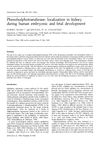 25 citations,
June 2013 in “Obesity Reviews”
25 citations,
June 2013 in “Obesity Reviews” Mesotherapy might help reduce fat in specific areas for those close to their ideal weight, but more research and care are needed to ensure safety.
 25 citations,
January 2002 in “Folia Pharmacologica Japonica”
25 citations,
January 2002 in “Folia Pharmacologica Japonica” Minoxidil helps hair grow by improving blood flow and increasing growth factors in hair follicles.
 25 citations,
July 1994 in “Archives of Dermatology”
25 citations,
July 1994 in “Archives of Dermatology” A man's skin condition, pemphigus vulgaris, came back after he was treated with interleukin 2 for cancer.
 24 citations,
January 2020 in “International Journal of Molecular Sciences”
24 citations,
January 2020 in “International Journal of Molecular Sciences” Some plants with flavonoids may help treat hair loss and promote hair growth.
 24 citations,
May 2017 in “Journal of Cosmetic and Laser Therapy”
24 citations,
May 2017 in “Journal of Cosmetic and Laser Therapy” The laser scanner device was more effective at increasing hair density than the laser hat in treating androgenic alopecia.
 24 citations,
January 2015 in “Annals of Dermatology”
24 citations,
January 2015 in “Annals of Dermatology” Herbal extracts may help hair grow and could be an alternative to synthetic hair loss treatments.
 23 citations,
December 2013 in “Regenerative Medicine”
23 citations,
December 2013 in “Regenerative Medicine” Hair follicle culture helps develop new treatments for hair loss.
 23 citations,
October 2006 in “Journal of Investigative Dermatology”
23 citations,
October 2006 in “Journal of Investigative Dermatology” Men with baldness have higher levels of specific proteins, suggesting local hormone production may play a role in hair loss.
 22 citations,
March 2020 in “Cosmetics”
22 citations,
March 2020 in “Cosmetics” Nanotechnology improves minoxidil treatment for hair loss.
 22 citations,
November 2008 in “International Journal of Dermatology”
22 citations,
November 2008 in “International Journal of Dermatology” A mix of 5-aminolevulinic acid and iron ion can speed up hair growth.
 22 citations,
February 2008 in “Journal of Neurochemistry”
22 citations,
February 2008 in “Journal of Neurochemistry” Minoxidil prevents serotonin loss from MDMA by affecting potassium channels and increasing Akt phosphorylation.
 22 citations,
April 1985 in “Australasian Journal of Dermatology”
22 citations,
April 1985 in “Australasian Journal of Dermatology” Beta-blockers can cause rare skin side-effects, which usually improve after stopping the medication.
 21 citations,
November 2022 in “Frontiers in immunology”
21 citations,
November 2022 in “Frontiers in immunology” Sebaceous glands play a key role in skin health, immunity, and various skin diseases.
 21 citations,
October 2018 in “European Journal of Pharmacology”
21 citations,
October 2018 in “European Journal of Pharmacology” Chemotherapy can cause brain inflammation and damage, and understanding this process could help manage side effects.
 21 citations,
September 2017 in “Journal of Obstetrics and Gynaecology Research”
21 citations,
September 2017 in “Journal of Obstetrics and Gynaecology Research” Chromium supplements don't improve insulin, hormone levels, or cholesterol in women with PCOS but raise testosterone levels.
 21 citations,
January 2017 in “Skin Pharmacology and Physiology”
21 citations,
January 2017 in “Skin Pharmacology and Physiology” Caffeine-based liquid 0.2% is as effective as minoxidil 5% for treating male hair loss.
 21 citations,
May 2016 in “The Cochrane library”
21 citations,
May 2016 in “The Cochrane library” Topical minoxidil helps treat female pattern hair loss, but more research needed for other treatments.
 21 citations,
November 2012 in “Plastic and Reconstructive Surgery”
21 citations,
November 2012 in “Plastic and Reconstructive Surgery” Both genetic and lifestyle factors significantly affect female hair loss.
 20 citations,
December 2015 in “Journal of Pharmacopuncture”
20 citations,
December 2015 in “Journal of Pharmacopuncture” Thread-embedding therapy helped hair grow back in mice and might do the same in humans.
 20 citations,
August 2015 in “International Journal of Molecular Medicine”
20 citations,
August 2015 in “International Journal of Molecular Medicine” Human placental extract may help hair growth by affecting certain cell signals and could be more effective with minoxidil.
 20 citations,
April 2014 in “Dermatologic Therapy”
20 citations,
April 2014 in “Dermatologic Therapy” Sulfotransferase in hair follicles helps predict how well minoxidil works for female hair loss.
 20 citations,
December 2011 in “Journal of inherited metabolic disease”
20 citations,
December 2011 in “Journal of inherited metabolic disease” Valproic acid treatment increases a specific acid in urine by blocking an enzyme, possibly causing skin rash and hair loss.
 19 citations,
July 2020 in “Journal of drug delivery science and technology”
19 citations,
July 2020 in “Journal of drug delivery science and technology” Nanoemulsions with minoxidil and clove oil effectively target hair follicles for better alopecia treatment.
 19 citations,
July 2018 in “Mechanisms of Ageing and Development”
19 citations,
July 2018 in “Mechanisms of Ageing and Development” Eating less can slow aging and help keep stem cells healthy by cleaning out damaged cell parts.
 19 citations,
May 2016 in “Clinical, cosmetic and investigational dermatology”
19 citations,
May 2016 in “Clinical, cosmetic and investigational dermatology” FGF-2&D/P nanoparticles can help treat hair loss.
 19 citations,
October 2012 in “Frontiers of Hormone Research”
19 citations,
October 2012 in “Frontiers of Hormone Research” Lifestyle changes are the first step in treating infertility in PCOS, followed by medications like clomiphene and metformin, and then surgery if needed.
 18 citations,
October 2018 in “Nutrients”
18 citations,
October 2018 in “Nutrients” Annurca apple extract promotes hair growth by changing hair follicle metabolism to boost keratin production.
 18 citations,
July 2009 in “Drug Metabolism and Disposition”
18 citations,
July 2009 in “Drug Metabolism and Disposition” Finasteride breakdown products found in bile and urine, helps understand drug safety and effectiveness.
 18 citations,
November 1994 in “Histochemical Journal”
18 citations,
November 1994 in “Histochemical Journal” The enzyme PST is found in developing human kidneys and helps with detoxification and development.
 17 citations,
November 2017 in “Dermatologic Clinics”
17 citations,
November 2017 in “Dermatologic Clinics” New techniques improve hair restoration success.






























